|
|
Kootenai Tribal Chairman Gary Aitken, Jr. at
Washington, D.C. Tribal Nations Conference today
Will attend meetings
with Cabinet Secretaries, President Obama |
|
November 5, 2015 |
Gary Aitken, Jr., Chairman of the Kootenai Tribe
of Idaho, is today attending the 2015 White
House Tribal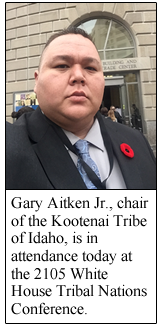 Nations Conference in Washington,
D.C., where he and other tribal leaders will
meet and confer with cabinet secretaries of the
federal government, members of the White House
Council on Native American Affairs, other
high-level federal government officials, and
also with President Barack Obama. Nations Conference in Washington,
D.C., where he and other tribal leaders will
meet and confer with cabinet secretaries of the
federal government, members of the White House
Council on Native American Affairs, other
high-level federal government officials, and
also with President Barack Obama.
President Obama is hosting 2015 White House
Tribal Nations Conference, which provides
leaders from the 567 federally-recognized tribes
an opportunity to interact directly with
appropriate government officials, discuss issues
of concern, share ideas, and provide input to
formulate policy.
"The purpose of the White House Tribal Nations
Conference is to cultivate a partnership with
the administration to allow them to understand
and respond to tribal priorities, and to
systematize this nation-to-nation policy,"
explained Mr. Aitken.
Today's Conference is the seventh White House
Tribal Nations Conference during President
Obama's administration, and the third Mr. Aitken
has attended. NewsBF contacted Mr. Aitken in
Washington, D.C., for updates on the Conference
and his views of the meeting.
Past Tribal Nations Conferences have achieved
important objectives, according to Mr. Aitken.
"First and foremost the importance of having a
place to voice our concerns has been
established," he said. "True collaboration is at
work. The ability to convey our message to the
cabinet members in one convenient place is
priceless. The messages we carry can reach in a
few days and sessions, what would otherwise take
individual tribes 30 or more office visits to
accomplish."
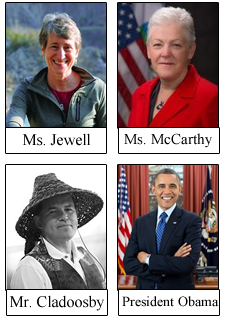 Officials
who will be giving presentations at this year's
Conference include U.S. Secretary of the
Interior Sally Jewell, who will open today's
meeting with remarks beginning at 8:30 a.m.
Eastern Time (5:30 a.m. Pacific Time), U.S.
Environmental Protection Agency Administrator
Gina McCarthy, National Congress of American
Indians President Brian Cladoosby. Many
other government and Native American leaders
will also participate in breakout panels and
town hall meetings. President Barack Obama is
scheduled to deliver a speech to the Conference
at 4:15 p.m. Eastern Time today (1:15 p.m.
Pacific Time). Officials
who will be giving presentations at this year's
Conference include U.S. Secretary of the
Interior Sally Jewell, who will open today's
meeting with remarks beginning at 8:30 a.m.
Eastern Time (5:30 a.m. Pacific Time), U.S.
Environmental Protection Agency Administrator
Gina McCarthy, National Congress of American
Indians President Brian Cladoosby. Many
other government and Native American leaders
will also participate in breakout panels and
town hall meetings. President Barack Obama is
scheduled to deliver a speech to the Conference
at 4:15 p.m. Eastern Time today (1:15 p.m.
Pacific Time).
For those interested, The White House Tribal
Nations Conference can be watched via live
internet webcast at this site:
www.doi.gov/live.
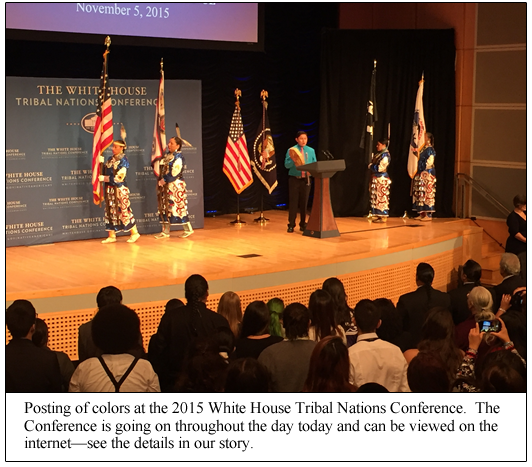
Mr. Aitken believes President Obama and his
administration has done more to work closely
with Native Country than have past presidential
administrations. "The White House Tribal Nations
Conference is largely driven by Native Country
to address Native Country's most pressing
issues. We are not simply being paid lip
service, there is an earnest attempt at working
together collaboratively to be able to encourage
that the federal government's trust
responsibility is being taken seriously and
upheld to treaty standards," said Mr. Aitken.
He went on to point out several areas where the
Obama administration has been effective in
working with tribes and addressing important
concerns. "This administration has supported the
United Nations Declaration on the Rights of
Indigenous Peoples. An executive order has been
issued improving educational opportunities and
strengthening tribal colleges and universities.
They have developed guidance for full
implementation of the Indian Child Welfare Act.
They have helped pass with a bipartisan effort
the Tribal General Welfare Exclusion Act,
implementation of the Indian Health Care
Improvement Act, and reauthorization of the
Violence Against Women Act."
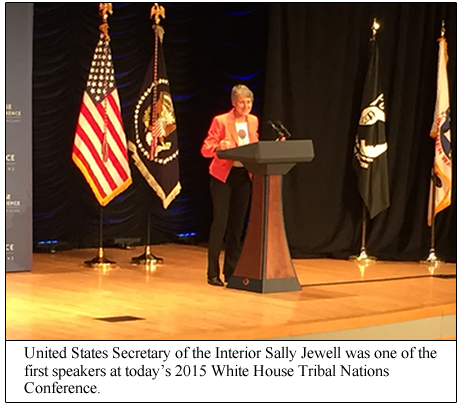
The White House Tribal Nations Conference is
more than just speeches. Other meetings and
presentational formats are also offered. "There
are meetings for Tribal leaders to discuss and
identify top priorities," said Mr. Aitken.
"There are breakout sessions in areas such as
natural resources, education, health care,
economics, and resilience. In addition to break
out sessions hosted by cabinet members and
others suited to convey the message to the
cabinet, this year there are 'town hall
meetings' to allow a chance for even more
meaningful dialogue to develop."
Mr. Aitken has several goals he is looking to
achieve at this Conference: "A personal goal for
me at this conference is to network and listen
to learn what other tribes are doing to succeed
and rise above issues that are also affecting
our people. Also, I hope to be able to share
stories of our successes and provide a blueprint
for others to move forward in a positive way.
"As far as Indian Country goals, I would say
that there is a heavy focus on cementing the
legacy of these conferences and systematizing
the process so that future administrations take
full advantage of the streamlined success that
has been achieved thus far."
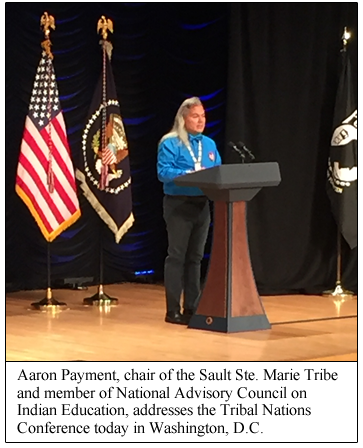
He further feels his representing the Kootenai
Tribe of Idaho at the Conference will provide
additional specific benefits for the Tribe. "The
benefits for the Kootenai Tribe of Idaho will be
to be able to share the blueprint of our
accomplishments with other tribes and agencies,
and also to glean what other tribes are doing to
have success in dealing with detrimental issues.
The hope is to learn what others are doing
successfully, and then work to apply it to our
needs."
The Kootenai Tribe of Idaho is known for its
success in several Boundary County area projects
and programs, including, among others, work in
restoration of habitat in the Kootenai River to
promote fish and wildlife populations, and their
work in aquaculture of sturgeon and burbot aimed
toward the re-introduction of these fish into
the Kootenai River. Do the successes of the
Kootenai Tribe ever come up for discussion at
these Washington, D.C. meetings?
" Yes," he said. "The collaboration work we have
been able to lead and be a part of are offered
as examples of how to be proactive in restoring
our ecosystem, and how to work successfully
being a part of collaboratives with entities
within our communities."
"I feel the collaborative work that our
community has accomplished is a blueprint and a
shining beacon of how things should be done. Our
story continues to impress and is something our
community should be proud of. We are leaders in
the truest sense of the word."
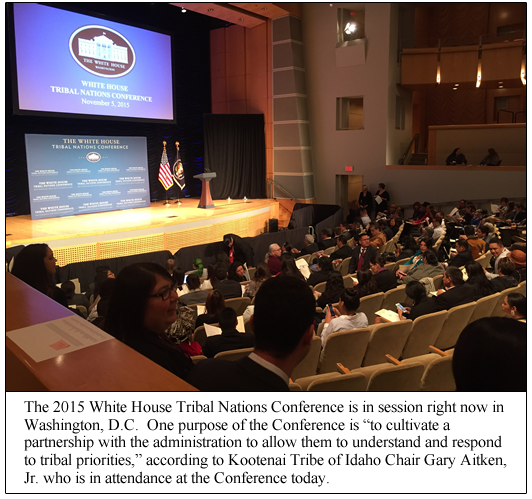
To see additional photographs of Mr.
Aitken's attendance at the White House Tribal
Nations Conference,
click
here.
(All photos courtesy
Gary Aitken, Jr. with the exception of the
following. Additonal Photo
Credits: Photo of Ms. Jewell courtesy U.S.
Department of the Interior. Photo of Ms.
McCarthy courtesy U.S. Environmental Protection
Agency. Photo of Mr. Cladoosby courtesy National
Congress of American Indians. Photo of President
Obama courtesy the White House).
|
|
|
|
Questions or comments about this
article?
Click here to e-mail! |
|
|
|
|

